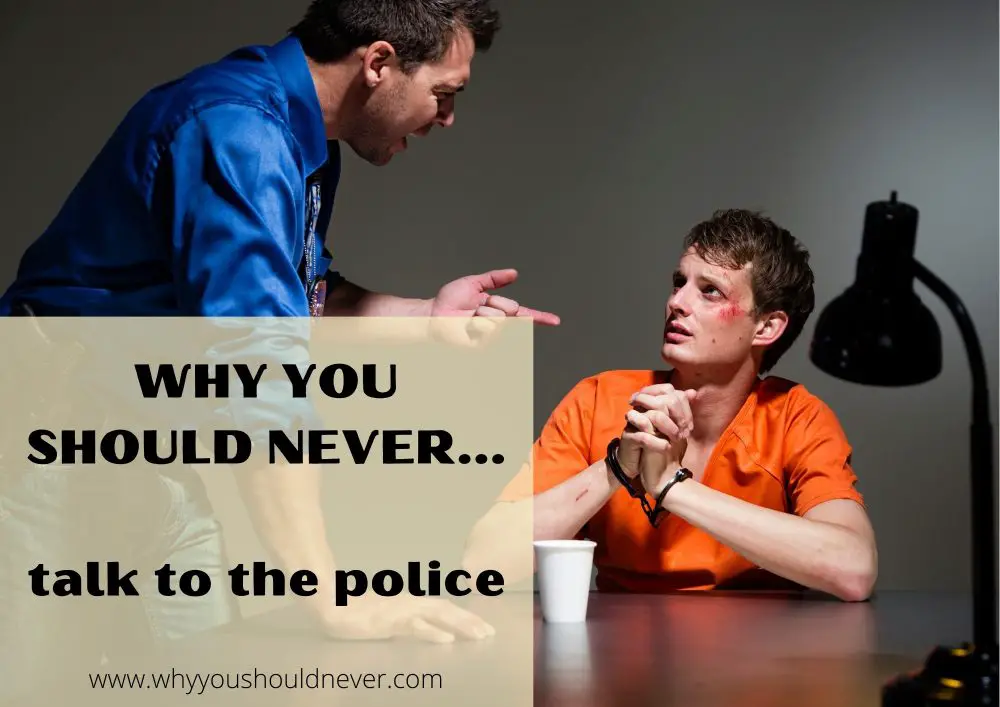![]()
Why You Should Never Talk To The Police/Cops
You’re probably thinking, “I’m a good person. I’ve never done anything wrong.” Maybe you think that just because you haven’t been in trouble with the law before, talking to police officers will be fine. That couldn’t be farther from the truth. In fact, it may be one of the worst decisions you ever make in your life.
Here are 6 reasons why you should never, under any circumstances, talk to the cops:
1. The police are not your friends
The police are trained professionals who do this for a living. If they can get anything from you that will help them close a case, they’ll do whatever it takes. This may involve luring you into a false sense of security and pretending to be a friend who has your best interests at heart.
They have no problem lying and misleading people if it helps their case.
2. You might incriminate yourself
You’ve seen the TV shows, watched all the movies; you know how the saying goes: “Anything you say can and will be used against you in a court of law.”
Even if it’s just a misunderstanding, anything you say could lead to criminal charges against you. You might think you’re helping to clear your name or simply give an honest account of what happened, but you could be putting yourself in a much worse position.
You have the right to remain silent
If you think that you might be in any sort of trouble, ask for a lawyer first. That’s the only thing you should ever say to the police. A lawyer will advise you on what you can and cannot say.
3. It could put your life in danger
There are bad people out there, people who are more dangerous than the police. If you happen to have some incriminating information about a criminal from, say, a gang, and you tell the police what you know, that person or gang could come after you or your family members.
Witness protection
This is used when someone witnessed a crime, testifies against the perpetrator, and has to be moved to a new state or country, have their names changed etc., as not doing so would likely lead to their murder, from vengeful people connected to the perp.
This is a very real possibility when a criminal finds out that someone’s talking to the police; and sometimes the police won’t be able to protect you from them.
4. Erroneous information could lead to wrongful convictions or criminals walking free
Sometimes we see what we want to see, or we don’t understand the things we see. It could be that the information you give to the police might actually hinder their case against someone who should be off the streets.
Or, on the flip side of that, you might give testimony that leads to the wrong person – an innocent person – being incarcerated. You wouldn’t want to live with that on your conscience.
5. Things can always go wrong when the police are around
Keeping your dealings with the police to a minimum is advised because they’ve been known to harm people, sometimes even the people who called them for help!
It’s best to only speak to them or call them when you’re desperate and there’s no other way to resolve an issue.
6) Police have arrest quotas to meet
It’s a sad but true reality that police officers are under pressure to make arrests, and when they have even the smallest suspicion of some wrongdoing, they won’t hesitate to arrest you.
If you talk to them, you risk giving them a reason to arrest you; whereas if you don’t, you lower your chances of getting in trouble.
Final words
The police will try to coax you into talking, that’s why it’s important to know your rights before you have any encounters with them. Although they may try to entice you into talking, you have no obligation to do so – that is your legal right. Remember that.
